
Vol. 1, No. 21 Published by India China Division, Air Transport Command June 7, 1945
|
Suffer Tragedy
Crack Troops are Flown in
To Aid of Chinese Defenders
Hq., United States Chinese Combat Command, China - Ragged, war-weary troops of the Chinese armies have successfully overcome the Japanese threat to the forward airbase and town of Chihkiang.
For the first time the Japanese have been denied an important objective. They had been willing to commit a large force to the taking of this area, and they failed.
Many military observers believe this may mark a turning point of Jap conquest in China. Not only did the Allied soldiers hold the enemy at Chihkiang, stopping them and turning the attack into a rout; Chinese troops have also entered Nanning, important point on that vital Japanese routes of supply and scene of a former 14th AAF airbase.
Troops Flown In
Although credit for the victory must go to the hard-pressed local Chinese troops, the defensive action (and the resultant offense) would not have been possible without the reserve support of the 14th and 22nd Divisions of the Chinese New Sixth Army. This complete army, including military supplies, rations, ammunition, mules, horses and other equipment, was transported to the combat zone by planes of ICD under the direction of the China wing.
Operating into Chihkiang when the Japanese snipers were at the very edge of the airstrip, (one fighter pilot was shot while he sat in front of the alert shack) flight crews seldom left the planes. Upon landing the planes were met by servicing units for refueling while the troops and equipment were off-loaded and then deployed immediately to strategic points.
While the planes roared in and out, American advisors, liaison personnel and technical units (including hospitals) were working in the forward lines, assisting the Chinese in the operations.
Nanning is Vital
The Chihkiang campaign is one of the best examples of Chinese-American co-ordinated operation since the Stilwell Road action by the same Chinese 6th Army that was flown to reserve positions in this recent battle. (Composed of General Chiang Kai-shek's prize troops, the 6th Army is advised, led and tutored by units of the Chinese Combat Command which teach the troops the usage of American equipment in the field.)
The recapture of the vital city of Nanning, approximately 330 miles west of Canton and 80 miles north of the Gulf of Tonkin, is regarded as important for three reasons. It is a terminal point for traffic westward of the West (Yu) River from Canton and Hong Kong; it is a junction point on the main road connecting Jap-held French Indo-China and Japanese forces in central China, and before its capture by the Nips, it was an important 14th AAF base.
Nanning, in south central Kwangsi province, was entered on Saturday by a strong Chinese force, attacking from the north, and by eight o'clock Sunday morning was completely in Chinese hands. The Japanese withdrew in two columns, one moving northward, the other to the southwest.
Air Move of Entire Army Prelude to Winning Push
1350 BU, Kunming - What was probably the first strictly ground arm (not trained as an airborne unit) ever transported with its animals to the front by air was moved to the Chihkiang front by transport planes of ICD.
Troops and supplies have been moved into combat areas before by ATC aircraft, but never on such a large scale as the Chihkiang offensive. The entire Chinese New Sixth Army was moved. Included in the air move were 1500 mules and all needed equipment.
In many instances the troops were traveling light. Groups of thirty-odd men brought for rations only 100 pounds of rice and peanuts and a large bunch of onions. Each group was accompanied by an American non-com who had trained them over a period of months.
On one occasion a radio operator smelled smoke during flight. Investigating, he found that it was chow time for the Chinese soldiers and they had built a fire on the shelf just back of his partition. While he munched on his vitamin crackers and canned pork and egg yolk, the Chinese boiled their rice and onions.
ICD Big Factor
Speaking for the U.S. Army Chinese Combat command, Maj. Gen. R. B. McClure, commanding general, complimented the China wing on its part in the victory.
"As usual, the China wing of the Air Transport Command played a conspicuous part in this victory. Once again it proved its ability to come through - to get men and supplies to the spot where they were needed and when they were needed, despite obstacles and difficulties."
General McClure also had high praise for the deserving men of his command who had worked so long and so patiently with the Chinese troops. The New Sixth Army had played an important part in the clearing of the Stilwell Road, had been ICD-flown from that area at the close of the Burma campaign to China, and thence to the front lines.
Show Beamed to United States Straight from Chungking Mike
As Mutual Marks ATC Birthday
Bob Brumby, Col. Bromiley Share in Review of Achievements
1350 BU, Kunming - China wing of ICD went on the air May 29, beamed to the United States on a direct hook-up picked up by more than 150 radio stations of the Mutual Broadcasting Company.
Occasion for the program was the fourth anniversary of ATC, and it marked the first time that any ICD unit has been featured in a radio broadcast direct from a Chungking microphone to Stateside speakers. Many thousands of Americans heard Bob Brumby, Mutual's war correspondent in Chungking, give a vivid description of how China wing personnel are fighting an aerial supply war in the forward battle areas of China.
Interviews CO
Brumby, who hails from Georgia, layed aside his southern drawl to deliver a fast-moving account of how the wing recently flew the entire Chinese New 6th Army over terrain often referred to as "tougher than the Hump," to the support of Chihkiang. A Jap drive on that important American base was stopped, disorganized and then torn to shreds by a rejuvenated Chinese defense force which had been backed up by new supplies and reserves flown in by countless plane loads of supplies at the crucial time.
Wing Commander Colonel Richard Bromiley, Philadelphia, was interviewed by Brumby and gave modest credit to all administrative sections and bases in the China wing for the splendid job they had performed since the very start of the organization.
Perilous Operation
Lt. William Burke, duty pilot from 1343 BU (Luliang, China), told how he and numerous other freight-hauling comrades had evacuated extreme forward battlefront bases which had not only been attacked but had been overrun by the Japs. He also related how it was often necessary to fly over active Nip fighter fields, going so close that the crews could see the red meatballs on the enemy ships.
Crew chief Pfc. Bert Wren, Dallas, Tex., from 1342 BU (Chanyi, China), who last month kept his C-47 aloft for 334 hours, presented a true picture of the trials and hardships faced by the mechanics and ground crews. He sketched a brief, unglamorous but true, picture of the boys on the ground who watch the transports fly by, knowing that those motors would not be purring such a sweet tune if it hadn't been for the fellows who handle the wrenches.
Correspondent Brumby recently had an article widely circulated in the States which said that China would be in ashes today if it hadn't been for ATC. He closed the 20 minute program by giving the entire outfit a sound verbal pat on the back and good wishes for an even more successful future.
The broadcast, which was arranged by the wing public relations office, could not be picked up on this side of the Pacific because of inadequate radio facilities.
Truck Convoy Rolls Along Stilwell Road, Is Right On Money
1348 BU, With ATC Convoy Enroute Over Stilwell Road - The ATC convoy pulled into this station today (June 6) without incident.
This is the first time in the history of the Road that an organization other than Motor Transport Service, SOS, has worked a convoy for China cargo delivery.
Lt. Terry rolled four double-bottom refueling units coupled to tractors over the roughest section of the Road. Such a heavy piece of equipment has never been driven over the route before. A cletrac is proceeding under its own power one day ahead of the main body of the convoy.
The convoy is on schedule, with only four 6x6s left behind at the ordnance repair shop. These trucks will catch up with the rest of the vehicles before reaching the final destination. Capt. Frost, officer in charge of the convoy, said that the spirits of the men were high and that they were all keyed with the determination to fulfill the mission.
The Hump Has Arrived - Is Discussed at Opera
1328 BU, Misamari, Assam, India - What are they talking about back home before "the conductor ascends the podium and the house lights are dimming?" The Hump.
Pfc. Joseph Masini, assistant base librarian, has a recent letter from his mother, who had been to a "Traviata" performance at the Mosque in Newark.
"Before the opera began," she wrote, "I happened to overhear some of a conversation being carried on between two ladies sitting in back of me. 'John says his mail is slow in arriving, but it can't be helped right now. The Hump is closed because of bad weather, you know.'"
Daring Tactics as SR Makes Contact In Game Preserve
1328 BU, Misamari, Assam, India - Search and rescue personnel here recently conquered an exceptionally tricky (if not entirely unique) problem. By a process involving the bouncing of a PT-17's gear on a field to test its firmness, and later a "diversion" flight by an L-5 contact was safely made with a wreck which reconnaissance had shown to be in the midst of a wild game preserve abounding in rhino, elephants and boars.
Major Ellis A. Carson, deputy commander, noticed the field not far from the wreck. Passing low over it and feeling it out with his gear, he decided that this would be the best way to reach the wreck.
While a rescue squadron L-5 circled overhead as an aerial shepherd holding the attention of the animals at a safe distance. Major Carson and Major Peter P. Gach landed the PT and proceeded along rhino trails, through elephant grass 30 feet high, to the scene of the crash.
Conducts Regular Sick Call in Nearby Chinese Village
1338 BU, Yunnanyi, Yunnan Province, China - Three months ago a young American soldier strolled through the streets of the village near this field. That GI started something which has made him probably the most loved and respected American in the vicinity.
Pvt. Jack Pitts, Austin, Tex., billeting clerk at this base, was taking pictures of local color when a scrawny child appeared in a doorway and beckoned him inside. Curious, Pitts followed and was led to a tiny, brick-walled room where a young mother lay in bed with her right side completely paralyzed. By her side stood a bewildered farmer husband with a wailing baby.
When the girl had become afflicted with infantile paralysis, the local so-called doctor had resorted to blood-letting at all joints along the afflicted side.
Delirious with fever, the girls was a parchment covered skeleton. The incisions made for the blood-letting had developed into ugly sores. She was almost dead. Pvt. Pitts had studied some medicine in civilian life, but it had been elementary, had not covered such advanced subjects as infantile paralysis. Things looked bad. Then Pitts thought of something.
This particular sector of China is honeycombed with natural hot springs. Being familiar with the great faith placed in this form of therapy in America, he decided to try it.
he talked some coolies into carrying the girl to one of the nearby springs on a crudely constructed sling. At the pool he had the girl lie in the warm bath for about an hour. This procedure was repeated daily for two months, Pitts paying the coolies out of his pocket. Today, the girl can walk without the aid of crutches. Her sores are completely healed and she has gained 20 pounds.
Daily Sick Call
In recognition for this the people of the village (who consider the healing a miracle) have raised a fund from their meager incomes to rent a room for Pitts where in his spare time, he conducts a daily sick call.
With his own money he has purchased first aid and medical supplies from the States. One of the educated girls of the village acts as a nurse. He has started a drive throughout the village to improve the sanitary conditions, has shown the people how to build fly-traps and has taught them the use of mosquito netting.
Most of his cures, Pitts says, are solely the result of disinfectant and common sense. Sores are sterilized and bandaged; diets contain more greens and less rice. His fame has spread and from miles valley people come to him for help. One old lady, convinced that Pitts is a wonderful doctor, has moved to this village so that she can be near his healing hands.
At the moment his medical supplies are inadequate; he is awaiting a package from home which will contain additional stock. His fine work has made him well-known and loved by the local people. He says he has never been so happy as he is while doing this work and would not be at all surprised if he returns to China after the war to continue his work in the small villages.
From a Good Neighbor, One Fifth of Old Stuff
1347 BU, Shamshernagar, India - With a long face and sad eyes Maj. Jay Lee, local operations officer, reported to P & T that he had lost a musette bag on his way to India from the States.
"The major looks worried. Must be something valuable in that bag," decided two P & T wallahs, T/Sgt. Bob Beers and Sgt. Bob Lawrence. They went to work.
A tracing letter in India brought no results. No dice was the answer from Africa. Then the sergeants got a clue. Somewhere in South America the major remembered that he had paused to chat with an acquaintance beside an MP booth. On this clue the P & T sleuths scored. Two weeks later, from an outlying ATC base in South America, came the musette bag.
The sergeants watched as the major's nervous hands opened the bag. Out came the valuable cargo - one fifth of Old Grand-Dad, still unbroken.
The sergeant's efforts were rewarded with a three-way split.
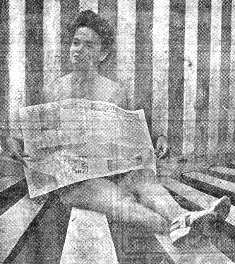 Pamela Nolan, India wing headquarters' slick-chick clerk-typist gathers a tan in New Delhi's torrid sun . .
Er, Pam, may we borrow your paper?
Pamela Nolan, India wing headquarters' slick-chick clerk-typist gathers a tan in New Delhi's torrid sun . .
Er, Pam, may we borrow your paper?
|
Sergeant Holds Down Airplane
To Prevent Imminent Accident
As Windstorm Sweeps His Base
Atlantan is Commended for His Vigilance And Quick Action
1347 BU, Shamshernagar, India - When a severe windstorm lashed this base recently at least one serious accident was narrowly averted by the quick action of S/Sgt. James P. Davis, aerial radio operator.
Davis, who hails from Atlanta, Ga., had just had his China-bound flight cancelled due to the approaching storm when he noticed that a nearby L-5 was swinging precariously in the whipping wind.
As he watched, the wind ripped a wing mooring loose, and just as he reached the plane the tie-down on the opposite side let go. The sergeant, a chunky six-footer, grabbed a wing tip and attempted to wrestle the plane away from a parked C-47 which was some 15 feet from the L-5. Despite a badly sprained left arm and shoulder, Davis hung on grimly until a group of linemen hurried to his assistance. Together the men headed the L-5 away from the C-47, into a slit trench.
Reporting to the base dispensary, Davis was treated for his injuries. Almost due to leave for rest camp, Davis was given a week's vacation in which to convalesce.
Commenting on Sgt. Davis' action, Lt. Col. Joseph C. Ware, Jr., base CO, praised the radio operator's disregard for his personal safety in saving valuable government property.
|
THE OLD SALT By Lt. Harriet Woods, ANC There's a sailor In this medical ward Who keeps this nurse From getting bored. His hair is red He's got some freckles; He grins all over While this nurse he heckles. We tried to tell him He was mighty sick. But he never believed it And recovered quick. He'd discuss his "Broads" With a knowing air And smiled in memory Of those that were fair. He'd mention nice places To dine and dance. Where he hinted he'd take me If I'd give him a chance. He'd talk of the gun crew For whom he sighted And hard, hard liquor In which he delighted. "The Navy's no place For a man," he stated. "It'll make him a bum For sure," he related. You'll certainly guess From what I've told That he's a sailor Old and bold. The catch to this, If you haven't foreseen - My precious patient Has just turned eighteen. Skip That Rendezvous By Sgt. Leonard M. Kushner, 1350 BU, Kunming, China With flowing tears And dripping goo, The poet writes "Keep Our Rendezvous." Of missing kisses He complains, Of tenderness, Of hollow pains. How sad to shed So many tears How cruel The swiftly passing years! How breaks his twisted, Lonely heart! How mad that they Should be apart! This silly drooling Leaves me cold, Yet many do it, I am told. I feel with every Passing hour Perhaps my grapes Are getting sour. |
Civvie Captain Now Lieutenant
Turned Down Commission in Navy to Become Shavetail
1348 BU, Myitkyina, Burma - When Lt. George A. Ford, a pilot here, came into the Army he gave up a captaincy to go for a second lieutenant rating.
Although this sounds like the outgrowth of a sake jag, the explanation is simple. In pre-war days, Lt. Ford was the youngest steamboat captain to hold a masters license.
When it came to the Armed Forces, he passed by a Navy commission of lieutenant commander to take to the air and see how the other half traveled.
A Captain At 25
The son of a sea captain, 30-year-old Ford was playing on decks of ships almost before he could walk. The elder Ford was with the White Lines, sailing out of Panama with fruit cargo. Seeing a more lucrative future in shipping on the Mississippi, Ford brought his family to St. Louis, Mo. It was natural for George to follow suit, and at 25 he became a full-fledged captain for inland and ocean waterways. Prior to joining the Air Corps in 1942, Lt. Ford was hauling war materials and pushing Navy craft from inland dry docks to New Orleans. On one of his last trips he guided three destroyers, 14 LSTs and four submarines down the muddy river to the sea. He considers this feat much more hazardous and thrilling than flying the Hump.
Sailing Requires More Skill
Comparing flying and sailing, Ford gives the nod to water as the more difficult mode of transportation. He points out that it took him five years to become a ship's captain and fliers are turned out in about a year. The difference in length of training for most men is even greater, since Ford was nearly 10 years under par when he became headman on the bridge.
Ford adds that weather, the bugaboo of flying, is just as dangerous to ships and docking a large river boat takes more skill and precision than landing an airplane.
When the war is over he plans to return to the long river - might even learn to swim.
Vodka Vendor's Strong Bid for Yankee Dollah
Quaint Letter Seeks Nod as Merchant of Orange-Flavored Death
1338 BU, Yunnanyi, China - Russian influence, coming to the fore so notably these days, has produced (among other things) a curious letter to an American officer here.
Exotic as the letter is, the general opinion here is that it may hold a hope for those who have suffered mightily from effects of "Jing Bao Ju" - the Chinese name for various local intoxicants.
"Dear Lieutenant:
"I have been fortunate to procure a gallon of alcohol of local make and immediately proceeded to experiment the production of Russian vodka. Herein I send you sample bottles of 'orange vodka' turned out by me.
$700 Per Bottle
"As the alcohol has turned out to be not pure, I have had to install a pilot filter and other paraphernalia, and it takes some considerable to produce any vodka of a required standard. I am afraid for these reasons my price for orange vodka cannot be cheaper than CN $700 per bottle (of the size of "tai bai ju"), excluding the cost of the bottle - it alone cost me CN $200 per piece. I shall therefore prefer to deliver in two-gallon vats, containing 12 bottles of vodka and valued at CN $4,200 for six bottles. My friends in Chungking deliver in similar vats.
Jin Production
"In a few months I shall be able to produce jin and liquors too, using the formula worked out by my friends in Chungking. If you consider the quality of my sample comparing favourably with anything the members of the United States Army forces are now drinking, I shall feel very much obliged if you will kindly hand over one of those samples and a copy of this letter to the officer in charge of supplies, to a person running the canteen, club, recreation hall or any place where moderate drinking is not a taboo ...
"I shall be glad to be introduced to the person named so as to establish a personal contact. I hope you will favour me with your comment on my venture, and remain "Very truly yours ..."
Official judgment on the "sample" has not been released, and the boys are sweating and hoping (against hope) the while they console themselves with dreams of "Stateside Ju" which the future may hold.
Lone Star Lovely is 1305 Sweetheart
1305 BU, Calcutta, India - Mentora Nowlin, a Texas lass who lives in DeLeon, is the winner in the 1305 BU sweetheart contest, and by a wide margin. He picture was picked by a committee of five from dozens of photographs submitted.
The pic was submitted by her fianc , Cpl. Ray Carter, who is sweating out that old return ticket with one eye on the calendar and one eye on Mentora.
The queen of 1305 hearts is a pert 19-year-old blonde, standing five and a half feet tall and weighing in at 110 pounds or thereabouts. She is blonde by nature, not chemistry.
Bridge Pro in Assam was Once Tutor of Socialites
1337 BU, Sookerating, Assam, India - Card men seldom play bridge with Cpl. Louis Gladstone for money. In fact, they seldom play bridge with Gladstone unless they are taking lessons. Gladstone was a professional bridge-wallah before the war.
A tutor and tournament competitor, the corporal had schools in Providence, R.I. and New Bedford, Mass., in which he taught society people how to become adept at the finer maneuvers of the game. Believing that the best way to learn was by playing out normally dealt hands he issued no written instructions, gave no notes.
Sims Is Best
He has played in tournaments with such experts as P. Hal Sims, Jacoby and the Culbertsons. Louis, talking of the current activities of these bridge greats, said they seldom enter competitive play. For the most part they have devoted attentions to developing young hopefuls and to writing books.
Gladstone considers Sims the finest card expert of the times, pointing out that the burly one was an authority on many card games besides bridge.
Teaches Soldiers
During the time he has been stationed at this base he has contributed freely of his time. Working with the Red Cross club he conducted classes in bridge and helped with the staging of weekly duplicate tournaments among the officers and enlisted men.
Louis has developed several here who are rapidly becoming fine bridge players. They have learned the fundamentals of the game, Gladstone says, and should be able to hold their own with the best after additional lessons and practice.
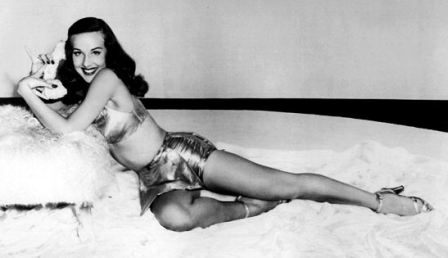 We find it troublesome to write cutlines for such pictures as this one of Virginia Hunter wearing silver pants and
playing handles on a telephone with no wire, so we borrow one from the British rag, "Picture Post." "It has always
been a principle in writing captions," they say, "that they must add something to the picture. If all one can find
is 'Whoops-a-Daisy: Three Happy Girls on Hamstead Heath,' then it's better to say nothing. But occasionally the
camera achieves results on which no words can improve. Here's an example! What could one add to this that would not be
platitude or repetition?"
We find it troublesome to write cutlines for such pictures as this one of Virginia Hunter wearing silver pants and
playing handles on a telephone with no wire, so we borrow one from the British rag, "Picture Post." "It has always
been a principle in writing captions," they say, "that they must add something to the picture. If all one can find
is 'Whoops-a-Daisy: Three Happy Girls on Hamstead Heath,' then it's better to say nothing. But occasionally the
camera achieves results on which no words can improve. Here's an example! What could one add to this that would not be
platitude or repetition?"
|
CHINA This Week
by Dwight Coolie
PRIVATE DOCTOR... Pvt. Jack Pitts, Austin, Tex., GI, is doing more for Chinese-American friendship than a carload of pin-striped ambassadors and leather brief cases.
With his own money, and in his spare time, he is running a one man dispensary for the Chinese people in a village near 1338 BU. It all started when he restored health to a young girl who had been stricken with infantile paralysis. Now he cares for any and all who find their way to the sick call he holds in a house the villagers have rented for him. His biggest concern is the small supply of medical equipment he has on hand. (Got any extra iodine?) The nod to Jack Pitts, Private, AUS : Doctor to the Chinese.
PASS IN REVIEW... On his last trip to China, S/Sgt. "Scoop" Zellinger, (Express) wandered off the beaten path and ended up in a walled city. After he had parked his jeep (owner unknown) a Chinese soldier walked up and dragged him off to a large compound where a bunch of troops were awaiting inspection.
While the sarge stood there the soldiers put on a snappy review, complete with highball and eyes right. At the close of the ceremonies the local big-dog offered our boy a puff on a water-pipe of friendship. He's still coughing blood.
THE ROAD BACK... In her 721st week of war China is starting a new phase of her long and weary battle. It looks like the first steps on the road back to victory. American and Chinese forces have a long way to go, but they're going and that's what counts.
For the first time since 1931 when the Japanese came down into the Northeast provinces, China is largely on the offensive side of the fence. After all these years the Japs have finally been stopped cold. The Nip was pushed all over the place at Chihkiang; he's still running.
It was a grand example of cooperation. While the ragged Chinese troops and their rugged GI non-coms of the Chinese combat forces were beating the hell out of the Nip in Hunan province, ICD was flying in reserves . . a whole army of reserves. The Chinese New 6th Army was flown in and marched off to strategic positions around Chihkiang. Over all this the 14th AAF flew fighter cover, went on forays and sorties to keep the Jap busy in other places and another part of the ground forces marched in to capture Nanning, site of an old 14th airbase. In the Foochow area Chinese troops kept pushing to the north. Things are going pretty well.
As June started, more supplies than ever before were being hauled over the rockpile and the Burma Road; the 14th Air Force and the Chinese Air Force were burning up the skies looking for anything they could find, and the ground troops were pushing ahead on all front.
Overseas Time is Long Enough, Points Are Low
A Tech Rep for Two Years, Is now a Pfc in India
1347 BU, Shamshernagar, India - GIs who think they have it tough should give an ear to Pfc. Bruce Shepler, aircraft maintenance inspector here, who has more than 31 months overseas and yet possesses less than two dozen discharge points.
Shepler's tale of woe began in May 1942, when, as a hydraulic specialist and all-around aircraft trouble-shooter, he volunteered for overseas service as a technical representative for Douglas aviation.
For 21 months Shepler remained in East Africa, setting up the first PLMs through Egypt, Arabia and Iran. In those days Rommel, the Desert Fox, was poised at Alexandria, and Italian paratroopers frequently filtered behind the lines attempting to harass operations. Bombed, shelled and strafed, Shepler nevertheless had the satisfaction of seeing the Fox flee to Italy with all the hounds behind him.
"Conditions were much worse than they are here," says the man who was there. "In Africa you've got to contend with the sirocco, the stifling hot wind from the desert. There are the sand storms, with a lack of shade and stout shelter in most places, and although the desert id frightfully hot in the daytime, at night it's freezing cold."
From September through November 1943, Shepler worked closely with the ATC in Arabia, then transferred to Lockheed, with which company he went to Ireland. In the land of the blarney he busied himself with modifications on aircraft engineering changes brought over from Uncle Sugar.
In April 1944, Shepler returned to Stateside where, within five days after his homecoming, he was greeted personally by the president. After a few months in training, Shepler entered the CBI, where he has been stationed for the past six months.
GI Entertains 1347 Transients
Brees, Former Entertainer Keeps Terminal Lively
1347 BU, Shamshernagar, India - Passengers coming through this base are pleasantly surprised when Cpl. Seymour "Buddy" Brees takes over with an innovation that sends them away a little less bored with the tedium of routine flight.
Brees, who knew his way around the entertainment world in civilian life, welcomes tired passengers at the terminal here with a line of fast patter, relaxing gags and amusing ditties. Quick on the down-beat, he kids them out of their ennui, and tense, travel-worn faces almost always break out into a grateful grin.
"Of course," says the jolly 200-pounder, "there are always a few who won't kick in with a laugh." And he tells the story about one deadpan heckler who simply refused to crack a smile.
"Look, bud, the laugh's on you," quipped the sour-face. "I'm headed back for Uncle Sugar to see some real talent!"
But it's all in the day's grind for the chunky song and dance man. Back in the '30's he broke into show business via WNEW, popular B.Y. airwave outfit of "Make Believe Ballroom" and "Milkman's Matinee" fame. There followed the usual sustaining spots during which the big boy was groomed for the big-time, and soon Buddy was being featured on commercials emanating from the major networks.
Brees recorded for the early "Victory Discs," once heard himself singing from a wax platter to a group of dayroom GIs. He recalls how Dinah Shore, Hollywood and Cafe Society chanteuse, and he, were once on the same spot at WNEW, both struggling to be "found."
California AWVS Plan to Send Xmas Packages This Year
Hq., Calcutta - The El Sereno AWVS, of Los Angeles, have signified their intentions of crashing through again with Christmas cheer for GIs of the ICD - but with a total of seven times the packages sent for the 1944 holidays.
The California women's organization has requested this division to consider arrangements to airlift 3500 pounds of Christmas bundles destined for ICD personnel.
Grateful GIs all through the area remember the joy dispensed by the 500 packages sent last year.
The new plan, if a way can be found to work it, will eliminate postage fees, allowing more of the collected funds to be spent on gifts. It would also add assurance that the packages will arrive safely and in good time.
GI Tonsorial Artist is RC Girls' Boon; Has No Competitors
1338 BU, Yunnanyi, China - The Red Cross gals here have an answer to their prayers in Pfc. Joseph A. Bonomo, a hairdresser originally from the Bronx who had been setting "perms" and creating exotic hairdos for several years in Philadelphia before coming into the Army. He has little or no competition in this field from local barbers.
Pfc. Bonomo took up the tonsorial art at the swank Maison de Paris hairdressing school in Philly and then went to work with several private salons before becoming affiliated with the beauty parlor of Gimbel Bros. department store in that city.
If the number of Red Crossers here should increase he plans to set up a real beauty shop. At the moment he is working on a hairdo with a Chinese touch, which he figures on for some real Stateside popularity, should it make its way back home now while interest in all things Chinese is high.
At the moment he is short of equipment, but a sawed-in-half oxygen tank serves for a hair drier - and who knows what could be done, he says, with spark plugs in the way of a "perm" machine?
 Rank Happy
Rank Happy
One of the most disliked creatures in the Army is the guy who pulls his rank without cause . . . the joker who thinks the amount of metal on the collar means more than the amount of gray matter in the bean.
Life in the Armed Forces is trying enough without adding any unpleasantness from guys that tend to hide behind their stripes or their bars. This kind of thing certainly does not raise the morale of those concerned; neither does it increase the efficiency of those who must work in this environment.
We do not say that all men with a little power or authority are "power-pimps" neither do we maintain that being rank conscious is the same as being "rank-happy." In fact, in some cases it would seem that the higher up the ladder a guy climbs, the more unassuming he becomes. The most likeable Joe in the Army is the man who is just a regular guy, who knows his proper place and is neither over-bearing nor unassuming.
As much as it bothers some, and as pleasing as it is to others, there will come a day when, after the war is over, each man will be accountable only to himself. When that time comes, as one GI put it, "I won't take any more of this old stuff."
There should be no objection to real military discipline. Truthfully, it is recognized as necessary to obtain the maximum efficiency from a great number of men. The majority of men realized when they entered the Armed Forces, that is was necessary to set aside their individual likes and dislikes in order to win the victory.
But they also believe - and it is a good American trait - that even in the hodge-podge of military juggling, a man is to be treated like a man, that he is to be respected as he is expected to respect. That is the American way . . . and this is the American Army.
Fools ?
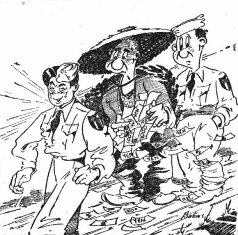 "I could swear he got the best of the bargain."
"I could swear he got the best of the bargain."
|
Thos GIs that were appalled by the atrocities of the Nazis at prison camps and concentration centers will not forget. In a way, they are fortunate. The sights they have witnessed will help them carry through life the determination that war shall not come again, that the enemy must pay for his crimes.
In the same manner we, perhaps are unfortunate. We have not come up against these realities of war. It will be easier for us to forget, easier for us to forgive.
Because of that, the guys in ICD must be all the more determined to remember how the Germans worked; how they mass-murdered, maimed and made merry with the bodies of humans. Those reeking piles of decay that were once people, those gas chambers and crematories . . . they are the best symbol of the Nazi way of life. Through them Germany should be remembered.
The world diplomats cannot make a world peace. Already conferences have been riddled with bickering, spattered with the rightful indignation of smaller nations that have been pushed aside with little regard. The majority members at the hub-hubs cannot remember the horrors of war because they never knew them.
But the boys in Europe knew . . . they will not forget. Let us not forget.
We will be fools if we do.
 Editor:
Editor:
Enjoyed the inclosed photograph of a C-46 over the Hump, entitled "Dumbo over the Rockpile." If possible, I would greatly appreciate a print of the photograph for my album.
- Cpl. George Argyris, APO 630 (Gaya, India)
Ed.- Sorry, no can do. Regulations forbid.
We of this base have seen in the Hump Express where the 1328 BU has boasted that they have the shortest topkick in the IB and C theaters.
We would like to refute their claim with one Sgt. Charles Reinemann, Jr., of South Holland, Ill. Sgt. Reinemann, who is assistant first sergeant of the transport squadron at this base, is four feet, eleven and three-quarters inches tall and weighs 198 pounds. He's the original "Mr. Five by Five."
In reference to an article which appeared in the May 17 issue, the ______ Air Transport Squadron (Mobile) would like to correct the 1342 Base Unit on the record for keeping a plane in the air during a period of one month.
During the month of January a C-46 (685) crewed by S/Sgt. Bob Garreth set what we believe is a record by being in the air 355:05 hours. Three 100-hour and four 50-hour inspections were pulled on the ship during the month. (On the last day of the month the aircraft was out because of engine change.)
- S/Sgt. A. B. Osterholt, APO 430 (China)
I have read numerous articles in your paper as to the superior food served at different base units. I would like to make a claim for our base. We have the worst food I have ever eaten at any Army camp, and I have been stationed at a lot of them during four years of Army service.
I once asked the mess officer if it was mandatory that eggs always be scrambled to that ghastly green. I wanted to know why they couldn't be fried once in a while. The answer was terse and to the point: "The cooks don't have the time."
There is a tasty little item served quite often called "pork and gravy." After taking one look at that succulent dish I am not able to eat for several days.
Sometimes I think that when awards and decorations are being passed out our cooks should get the Japan Diet Medal of Honor for making American stomachs unfit.
(For gosh sakes, if you print this, do not use my name.)
Ed.-More power to Sgt. Anonymous for a cogent letter. You indicate in paragraph two, Anon, that you do have fresh eggs. Where are you? We would like to be there.
Your May 24 edition was devoted primarily to the accomplishments of the ATC during the past four years. In some future edition will you mention one of its most obvious shortcomings, the inadequacy of its TO?
There is the unending advice, "Patience - the new manning table (next month) will readjust this
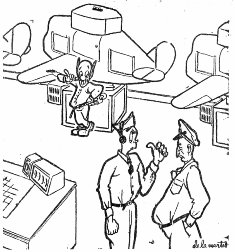 "All I know is that he just stands there insisting on a 40-hour check."
"All I know is that he just stands there insisting on a 40-hour check."
|
I have the reactionary idea that a man should be rated according to his assigned duties and the degree of efficiency with which he performs them. The bombardment groups hold this same fantastic theory. For instance, a radio operator who finishes his combat tour is automatically made a tech sergeant. If this theory were applied to the Hump it appears to me that a radio operator upon finishing 750 Hump hours should be a buck sergeant as rock-bottom minimum, or (more fairly) a staff sergeant. (I think tech should be reserved for the additional required skills and hazards of combat flying.) If an enlisted man hasn't been expert enough to deserve this rank, I think he should be regarded as too inefficient to be on a crew where the lives of three other men, a valuable cargo, and one airplane with an incalculable "here and now" tactical value (as well as being worth bahoot rupees) may depend on how well he does his job.
All we need is somebody to type up a new TO (probably a tech sergeant) and somebody to sign it (preferably a general). Hump Express, won't you institute a search for these two men?
The ATC is getting plenty of recognition from the Stateside press. (I have it from a man high up in latrine circles that Billy Rose is angling for some of the PR staff.) Is there any chance of the men in the ATC receiving a little recognition from the ATC?
- Suppliantly yours, Pfc. Richard (650 hours and sweating out corporal) Mallon, 1330 BU
Ed.-We know how you feel. TO? NO! TS? Yes!
 "Chaplain, you should have been with us on our trip last night. We made a chapel out of our plane and
needed your prayers along with our own."
"Chaplain, you should have been with us on our trip last night. We made a chapel out of our plane and
needed your prayers along with our own."
These words, spoken by one of our pilots the other morning, were not strange to the chaplain's ears for on several occasions during the past months crew members have made similar remarks about their experiences on trips.
The chaplain has endeavored to assure these men, and all other crew members, of his presence with them on their flights through his thoughts and prayers.
This experience may not strike a responsive chord for some who have flown the Hump or the routes of China, but for many others, who day and night, through all kinds of weather fly in this theater, there is complete harmony with this experience.
This need of an assuring presence and of prayer by air crew members is kindred to the needs of men in times of crisis and battle. To feel that they are not alone but are supported by the power of one they trust, in addition to the thoughts and prayers of their loved ones, will give the added strength and faith needed to answer the demands at critical periods in the experiences of life.
The chaplain will long remember his flight over the Hump from India to China and the need he had for faith in the crew members, in the airplane, in the direction given by the operational officers as the pilot made an instrument let-down to land at the field in China - and in the unseen "co-pilot."
There was that nervous tension brought about by anew and strange experience and that ever-present fear for personal safety as the ship descended through the clouds ('soup' as air men call it) filled with rain and cold air which formed ice on the wings, fuselage and props.
As a passenger, the chaplain realized that his life was in the hands of others. Only faith in them and the unseen "co-pilot" prevented panic. That plane also became a chapel. From the lips of crew members the chaplain has heard that this experience is repeated often.
By their attendance at chapel services, by their daily actions and conversations, by their hopes expressed for the future the chaplain realizes that God has touched the lives of these men who fly, who make chapels out of their planes, and who are aware of their unseen "co-pilot."
- Chaplain Charles F. Bruce, Capt., 1342 BU, Chanyi, China
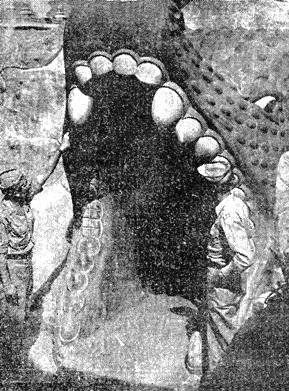
|
|
TEMPLE GARDENS 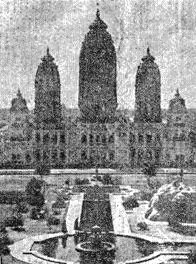
|
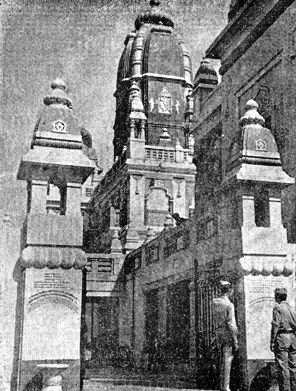
|
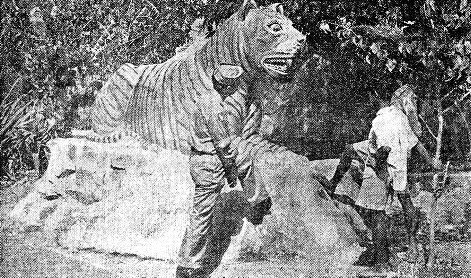 It is difficult to think of an animal not represented among the sculptures of Birla Gardens. All sizes and in many
scales, their gaudy colors are as astonishing as some of their facial expressions. Younger habitues of the park are
eager to explain them to GI visitors, always stressing that they have no symbolic significance but are for amusement.
This is not just a tiger, they insist, but a Bengal tiger.
It is difficult to think of an animal not represented among the sculptures of Birla Gardens. All sizes and in many
scales, their gaudy colors are as astonishing as some of their facial expressions. Younger habitues of the park are
eager to explain them to GI visitors, always stressing that they have no symbolic significance but are for amusement.
This is not just a tiger, they insist, but a Bengal tiger.
|
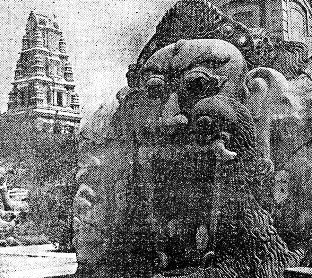 The caves are for rest and meditation, helping to make the park "a rendezvous for the pleasure-loving people of New
Delhi." This last is quoted from the comment of a young Hindu asked to contribute to the descriptions. Above is "a
sort of ghost spreading out his mouth to swallow persons getting in."
The caves are for rest and meditation, helping to make the park "a rendezvous for the pleasure-loving people of New
Delhi." This last is quoted from the comment of a young Hindu asked to contribute to the descriptions. Above is "a
sort of ghost spreading out his mouth to swallow persons getting in."
|
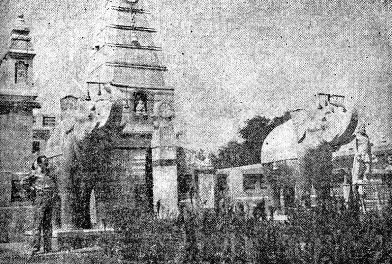
|
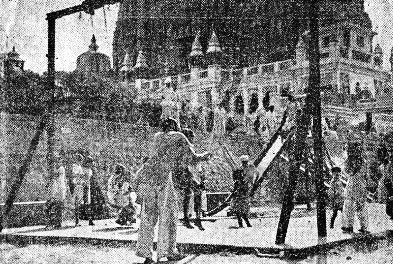
|
Birla Temple Gardens are only 16 years old, the opening ceremony having been performed by Mahatma Gandhi in March, 1929. The hope that they would "usher in a new era of peace and happiness in the world" was inscribed near the cornerstone at the behest of the Japanese consul. Beside one of elephants signifying welcome to the Buddhist temple and the Buddhist section of the gardens, Pfc. Lester D. Flick surveys the mandap (rest garden) adorned with statues of ancient Indian rulers. Lord Buddha sits in a niche in the central tower, and, says our commentator, the inscriptions below "try to give a brief history of the spreader of this faith." Also "there are statues of those who first gave a good spade work to fructify the faith." It is understandable that "people come here to shake off their worries in the evening," since "a man here is not disturbed by the hawkers, and can come, sit and enjoy this beauty fully." (Right) The very young too have their corner of Birla, and add their careless chatter to the drone of worshippers from the temple above. (Photos by Pfc. John McKinney, 1307.)
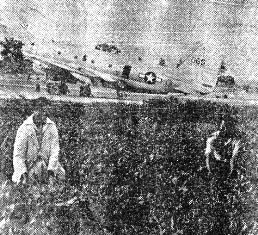 No cobras or monkeys in this, but no scrapbook of "typical India" shots could be complete from the GI viewpoint
without a glimpse of Assam's endless tea fields. C-46s line up beside the tea, others roar overhead, but the
changeless work of the tea pickers goes on - and somewhere a professional sipper is probably wondering right now if
that slightly different aromatic tinge couldn't be a trace of exhaust fumes.
No cobras or monkeys in this, but no scrapbook of "typical India" shots could be complete from the GI viewpoint
without a glimpse of Assam's endless tea fields. C-46s line up beside the tea, others roar overhead, but the
changeless work of the tea pickers goes on - and somewhere a professional sipper is probably wondering right now if
that slightly different aromatic tinge couldn't be a trace of exhaust fumes.
|
Karachi Pandit Discourses on Beliefs and Characteristics of Followers of Mohammed
Islam Founded by One Called Al-Amin
"Worthy of Trust," He States
(Editor's Note: The views expressed in this article are those of the writer and do not necessarily reflect the opinion of the ICD or the Hump Express.)
By Prof. B. J. Vaswani
Who is a Muslim? Not a burly wild man who throws you out. He is just the follower of the religion of the prophet Mohammed. His religion is called Islam, and is the faith of 75 millions of people in India, and millions more in Egypt, Turkey, Arabia, Persia, Syria, Afghanistan, as well as some millions in China and Russia.
This religion was begun by the prophet Mohammed from Arabia in the seventh century A.D., and spread far and wide to the east and to the west - east as far as China and west, at one time, as far as Spain.
Mohammed Was Al-Amin
In Europe, Islam is much misunderstood as a fanatical, persecuting, and unprogressive system of thought and life, but it had a glorious origin and history and has a great mission. Prophet Mohammed was born in difficult times amongst a people sunk in ignorance and superstition, but every one in Mecca knew him by the name of Al-Amin, "Worthy of Trust."
Many stories are told of his kindness to all creatures, of his treatment to the slaves equal to that given to the proud Qoraishi tribe, of his charities, of his generosity to foes, of fasting and prayers. He bore a great deal of persecution from the men of his own tribe, but he succeeded in overcoming all obstacles and sending the flame of a new faith spreading like a prairie fire across the world, and Islam today is one "magic casement" of Divine Truth, along with the other great religions of humanity.
The one great book of the Muslims is the Koran, the book of revelations made by angels to Prophet Mohammed. The word "Islam" means "submission to the will of Allah (God)," and a Muslim, according to the holy Koran, is he who has made his peace with God and man.
Prescribed Discipline
Monotheism is the most outstanding article of faith in Islam. "There is no god but God. Him do we serve, surely we are from Allah, and to him shall we surely return."
Following this cardinal concept of Islam, there is a discipline prescribed for every adherent without which access to spiritual life is difficult. This discipline is: Salat, daily prayer; Saom, periodical fasting; Zacat, monthly charity; Haj, pilgrimage to Mecca.
A true Muslim must pray to God five times a day, at fixed intervals, turning to Mecca and repeating the formula about the Oneness of God, His Mercy, Justice and so on. There are certain times of the year when every Muslim must fast each day. Prayer and fasting are the purification of mind and body. Poor rate or charity is obligatory on all true Muslims.
Pilgrimage to Mecca once in life is incumbent on every Muslim, subject to the condition that he has the means to undertake the journey as well as provide for his dependents. Pilgrimage among Muslims is one of the most spectacular acts of democratic spirit - for during pilgrimage all distinctions of birth, rank and wealth are eliminated, everyone wearing the same simple dress and living in the same simple conditions.
The Muslims, because they belong to a comparatively young religion, have not a large number of sects, the sense of kinship being still very strong among them. Two main divisions, however, are the Sunnis and the Shias. Islam has also an esoteric or mystic side, called Sufism, which is something like the Hindu Yoga, a system of disciplines for the revelation of the self with the Universal Self.
New Radio Station Coming to 1328 BU
1328 BU, Misamari, Assam, India - A 50-watt transmitter and all equipment to go with it have been received here, the information and education department has announced.
At the same time it was revealed that an Armed Forces Radio franchise has been received which will enable the transmitter to serve both this base and the 1327 BU (Tezpur).
Equipment includes a basic library of recordings a running stock of new records and transcriptions, turntables, and microphones with relay equipment for remote-control broadcasts.

Silver Leaf Has Troubled Brow On Islam Ways
Fails to Digest Economics of Wedding Day Prodigality
Hq., Calcutta - A lieutenant colonel here is puzzling over the ways of Mohammedans - not from the ethical standpoint, but the economic.
"How is your brother these days, anyway?" he asked a Mohammedan friend.
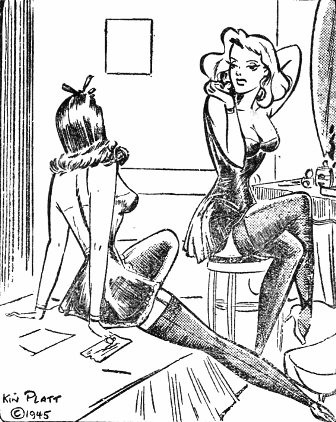 "He says he's been caught with his points down!"
"He says he's been caught with his points down!"
|
"It was not the marriage that pained him," said the friend. "It was most agreeable to him. But you see, there were 500 costumes to be provided, 500 guests to be fed for a whole week, and the dowry. Altogether it came to about Rs. 30,000."
"Are his circumstances such that it will be disastrous?" asked the colonel.
"Oh no. By managing well, he will just about survive the expense. But what depresses him is that he has four more daughters, for whom, in time, all these things must be provided."
Honorable Men
1333 BU, Chabua, Assam, India - Honor has not perished from the earth, and here is the ultimate proof.
In September, 1944, the boys in the Karachi I & S section got together and decided to get up a winner-take-all pool on the end of the war in Europe. For one rupee any contestant could drop a guess in the box. Guesses ranged from two weeks to two years but the closest guess was only eleven days off - April 27th.
The winner was Major (then Captain) W. J. Pritchard, at that time base engineer at Karachi, who has since been assigned to headquarters here in Calcutta and spends most of his time on TDY in the field. The other day a letter dated May 9 reached him here after following him from base to base in the Valley. Signed by S/Sgt. Neil O. Glenisky, treasurer of the pool, it enclosed a money order for forty dollars and thirty-six cents.
HUMP EXPRESS is the official newspaper of the India-China Division, Air Transport Command, APO 192, c/o Postmaster, New York, N.Y., and is published by its Public Relations office. Camp Newspaper Service and Army Newspaper Service features are used, reproduction of which is prohibited without permission of CNS and ANS, 205 East 42nd St., New York, 17, N.Y. Other material is submitted by staff members, ICD-ATC base Public Relations sections and other soldier correspondents. Printed weekly by the Hindusthan Standard, 3 Burman St., Calcutta, India, and distributed each Thursday. Passed by U.S. Press Censor for mailing.
| Military transport schedules over India for cargo, personnel and mail . . . maximum tonnage of essential war materials over the Hump . . . movement of troops and supplies in support of tactical operations in China . . . evacuation of the sick and wounded - these are the missions of ICD-ATC. |

JUNE 7, 1945
Original issue of HUMP EXPRESS shared by CBI veteran Steven C. King, author of Flying the Hump to China.
|
A better quality image of the photo of Virginia Hunter was used in this recreation. |
Copyright © 2007 Carl Warren Weidenburner
TOP OF PAGE PRINT THIS PAGE ABOUT THIS PAGE E-MAIL YOUR COMMENTS
PREVIOUS ISSUE HUMP EXPRESS BASE NEXT ISSUE
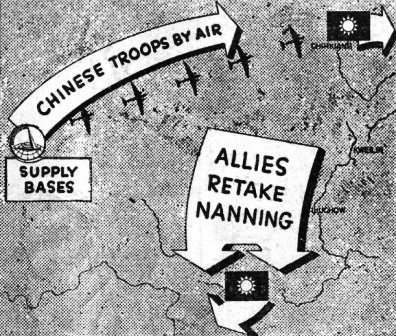 On two fronts in China the Japs have been stopped cold and the Chinese armies are on the offensive. At Chihkiang
reserves had been flown in (one whole army) to form the reserves so holding forces could go on the offensive. In the
Nanning sector the Chinese were advancing on two fronts.
On two fronts in China the Japs have been stopped cold and the Chinese armies are on the offensive. At Chihkiang
reserves had been flown in (one whole army) to form the reserves so holding forces could go on the offensive. In the
Nanning sector the Chinese were advancing on two fronts.